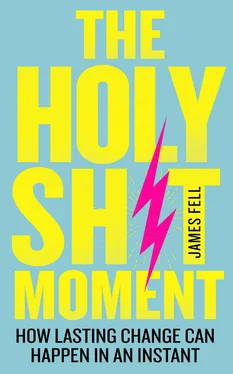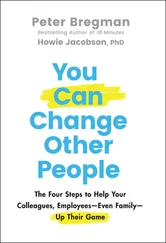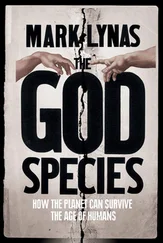As British historian and philosopher Arnold Toynbee said, “The supreme accomplishment is to blur the line between work and play.” Your passion to achieve can be triggered in that single defining moment when you realize, Enough of this bullshit. Motivation is no longer a scarce resource after such a momentous event. It comes built in.
Being active is hard. Eating healthy is hard. Conquering addiction is hard. Relationships are hard. Making money and advancing your career is hard. Life is hard, whether you choose to work at improving it or not. A life-changing moment can make everything much less of a challenge. Sometimes, if the epiphany is powerful enough, it makes the changes not just easier but mandatory, because every new step feels as though it was meant to be. The recipient of the epiphany is compelled to walk this new path, perhaps even race down it.
Speaking of racing and things that are hard, recall the words of President John F. Kennedy regarding the space race and putting a man on the moon. He said we choose to do these things “not because they are easy, but because they are hard.”
You should aspire to do more with your life.
Because it is hard.
Act Now!
Dream (realistically) big and imagine the new person you want to be.
Think of an ambitious quest you could undertake.
Develop a thirst for adventure. Remember the librarian who traded cigarettes for swords.
Consider not using a notebook, but instead committing ideas to memory for regular rumination to achieve later enlightenment.
Ponder until you “get stuck.” Then engage in a diversion to let your unconscious continue working at it.
Endeavor to meet the magic moment partway. Realize you may have to engage in some uninspired work prior to the lightning strike.
Become attuned for lightning to strike. Ask yourself, “Is this it?”
Ask if a life-changing moment has happened to you before. Examine if this is something you have experience with—determine if you have a past performance accomplishment—so you can use that knowledge to make it happen again.
Accept that work is not only necessary but glorious in its ability to inspire passion and transform you. Try to find work that will feel like play.
Remember the words of JFK and embrace change: because it is hard.
PART ONE
Epiphany and Cognitive Behavior Change
1
THE ANTIDOTE TO DESPAIR: THE EUPHORIA OF THE LIFE-CHANGING MOMENT
There are opportunities even in the most difficult moments.
—WANGARI MAATHAI
On the schoolyard field of battle known as gym class, I made the geeks look good. I was such a klutz, I was always picked last when teams were selected. I often came out of dodgeball with head trauma.
In college, I got the “freshman fifteen”—those pounds one tends to put on during their first year—factored by three. I was twenty-two and felt my life was circling the drain. As mentioned before, my health, finances, and scholastic situations were a mess. There was no fall from grace; my life had always been blah, and it was my fault.
I wasn’t just a bad athlete growing up, but a bad student. I was smart but lazy. I squeaked my way into an easy postsecondary program with half a percentage point to spare, then promptly began failing. I went to the campus pub instead of class. The credit-card companies were calling. Things were bad and looking worse; I was about to be kicked out of school because of my poor grades.
I was in a hole of my own digging; Joan Baez pulled me out.
The folk singer’s words appeared in the school newspaper, and my life changed in a moment.
“Action is the antidote to despair,” the quote read.
I sat in the food court at my alma mater, reading the comedic highlights of the paper’s section referred to as “Three Lines Free.” It’s a place for students to publish quotes and witticisms and proclamations of undying love or temporary lust. Partway through reading, Joan smacked me in the face. It was so simple to realize that, as bad as things seemed, they could be fixed via concerted effort.
In that instant, my life switched tracks.
Because, you see, there was a woman.
Her name was Heidi. I loved her like no other. You know stories of finding “The One”? This is such a story.
She was a straight-A student destined for medical school; I knew flunking out spelled the beginning of the end. I say this not to ever speak ill of her. But you must know that she, an amazing woman, deserved a good man; a man I had yet to become.
I was in a state of despair, and taking action—working hard for something for the first time in my life—was the antidote.
And suddenly I felt so much better. Even though no effort had yet been expended, the anticipation of having these problems and this beer belly no longer weighing on me was euphoric. It’s like when you hear your parole has been approved and you’re getting out of prison but you’re still in prison. I’ve never been to prison. I got some speeding tickets when I was younger, but I paid them. Anyway, euphoria and stuff …
Instead of hitting the pub as I’d planned for a few barley-based beverages to wash down a plate overflowing with fries and gravy, I got up and booked an appointment with the appeals committee to beg my way out of my failing report card, allowing me to continue as a student. It was the first step of many, and it felt right.
When it comes to experiencing a life-changing epiphany, the way things feel is critical. It involves, as mentioned earlier, unleashing one’s inner quadruped.
The concept began with the classical Greek philosopher Plato. In the fourth century BC, Plato wrote a “dialogue” titled Phaedrus, which contains an allegory about the charioteer. In it, the driver of the chariot represents a person’s more rational self, the guiding force based on intellect and reason. (Because those guys doing the death race in Ben-Hur were totally reasonable.) Conversely, the horses pulling the chariot represent a person’s emotions; they are what provide the power to move forward. And if they want to run wild, the driver of the chariot can do little to control them.
Let’s ignore the part about Plato’s horses having wings, so as not to confuse the issue.
It is important to note that the horses are not like-minded. According to Plato’s tale, one is more virtuous in its passion; the other has a dark side driven by baser appetites. One wants to train for a marathon; the other wants to down tequila shots then go in search of a chili cheese dog to later throw up.
The goal of the charioteer is to obtain the help of the noble horse to overcome the desires of the troublesome one. Otherwise, you’re blowing your groceries in the gutter. I’ve done that. It’s not fun.
The allegory was adapted some millennia later, in 2006, with the publication of The Happiness Hypothesis by New York University social psychologist Jonathan Haidt, who referred to the rational, conscious mind as the “rider” and increased the size of the emotion-driven, unconscious-mind quadrupeds to a solitary elephant. Part of the upgrade involved increasing the intelligence of the beast, asserting elephants are smarter than horses. As we’ll see when we examine the neuroscience of attaining sudden insight, Haidt is right. In most cases, the unconscious driver is the correct one; the conscious needs to learn to listen.
A short time later, the rider-vs.-elephant analogy became a core component of the 2010 book Switch: How to Change Things When Change Is Hard , by brothers Chip and Dan Heath. Chip is a professor of business at Stanford, and Dan is a senior fellow in entrepreneurship at Duke.
Читать дальше












